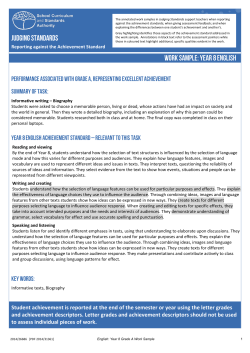
Student achievement is reported at the end of the - K
The annotated work samples in Judging Standards support teachers when reporting against the achievement standards; when giving assessment feedback; and when explaining the differences between one student’s achievement and another’s. Grey highlighting identifies those aspects of the achievement standard addressed in the work sample. Annotations in black text refer to the assessment pointers while those in coloured text highlight additional, specific qualities evident in the work. Reporting against the Achievement Standard Imaginative writing: Mahtab’s first day at school in Australia Students had read and studied Mahtab’s Story by Libby Gleeson. They were required to create an additional chapter of the book to describe Mahtab’s first day at school in Australia. Students researched both in class and at home. The final copy was then completed in class on their personal laptops. The school and teachers’ names have been removed for privacy. Reading and viewing By the end of Year 8, students understand how the selection of text structures is influenced by the selection of language mode and how this varies for different purposes and audiences. They explain how language features, images and vocabulary are used to represent different ideas and issues in texts. They interpret texts, questioning the reliability of sources of ideas and information. They select evidence from the text to show how events, situations and people can be represented from different viewpoints. Writing and creating Students understand how the selection of language features can be used for particular purposes and effects. They explain the effectiveness of language choices they use to influence the audience. Through combining ideas, images and language features from other texts students show how ideas can be expressed in new ways. They create texts for different purposes selecting language to influence audience response. When creating and editing texts for specific effects, they take into account intended purposes and the needs and interests of audiences. They demonstrate understanding of grammar, select vocabulary for effect and use accurate spelling and punctuation. Speaking and listening Students listen for and identify different emphases in texts, using that understanding to elaborate upon discussions. They understand how the selection of language features can be used for particular purposes and effects. They explain the effectiveness of language choices they use to influence the audience. Through combining ideas, images and language features from other texts students show how ideas can be expressed in new ways. They create texts for different purposes selecting language to influence audience response. They make presentations and contribute actively to class and group discussions, using language patterns for effect. Imaginative texts, Creative texts, Narratives Student achievement is reported at the end of the semester or year using the letter grades and achievement descriptors. Letter grades and achievement descriptors should not be used to assess individual pieces of work. 2014/27681 [PDF 2014/28672] English: Year 8 Grade C Work Sample 1 Uses a series of questions in introduction to convey character’s confused and emotional state. Makes brief reference to stimulus text, e.g. ‘… so we could have a fresh new life in Australia.’ Expresses ideas clearly, using formulaic simple, compound and complex sentence structures. Uses familiar descriptive language, e.g. ‘cute little houses’, ‘beautiful gardens’, ‘very good conversation.’ 2014/27681 English: Year 8 Grade C Work Sample 2 Uses a range of punctuation, sometimes inconsistently, e.g.’ “Hello my name is Mahtab I am the new girl at M… Do you mind if I come sit with you?”’ Uses relevant, but often clichéd figurative language, e.g. ‘I felt like I was stuck in a black dark maze.’ 2014/27681 English: Year 8 Grade C Work Sample 3 Uses repetition for effect, e.g. ‘I sat on the same oval with the same girls, in the same corner.’ Spells most common and some difficult words correctly. Uses relevant, but often clichéd figurative language, e.g. ‘everyone rushed out like a herd of elephants.’ Concludes with a simple but satisfying ending. 2014/27681 English: Year 8 Grade C Work Sample 4
© Copyright 2025





















